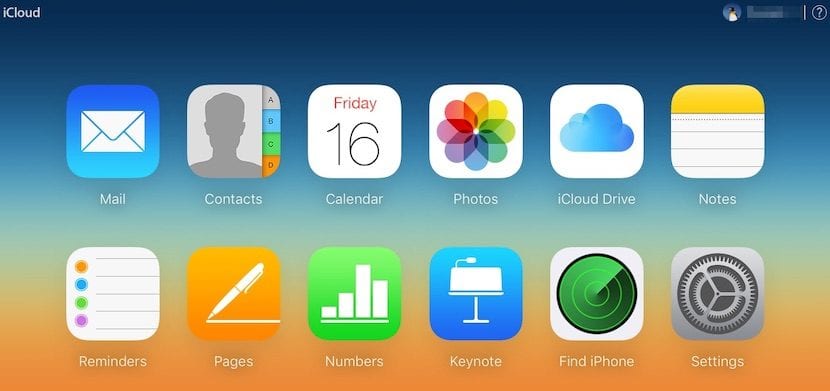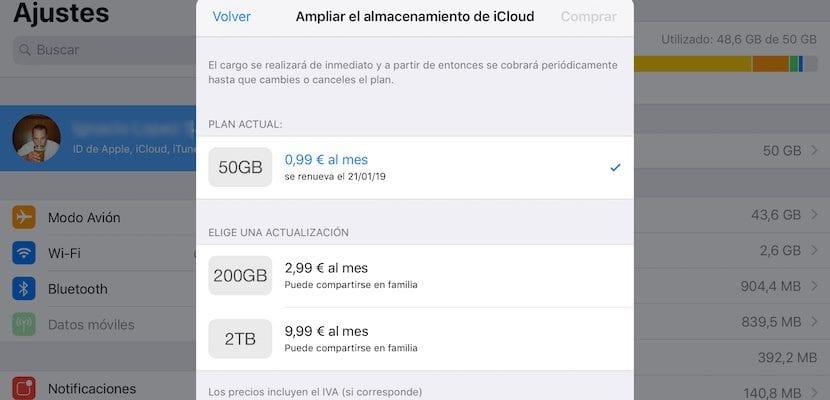
In recent years, storage space in the cloud has become a priority for all those users who need, yes or yes, to always have their files at hand at all times. Currently we have at our disposal a wide variety of storage services that they offer us an amount of GB for free.
Among all the services that we have at our disposal, Google Drive is the most generous of all with 15 GB free while Microsoft's OneDrive and Apple's iCloud are the most stingy. Although it is true that there are more storage services, only these three are linked to a software manufacturer. If you have problems with Apple's cloud storage, we will show you below how to free up space in iCloud.
Every user who has an account associated with Apple services, has at his disposal 5 GB of space completely free to be able to store backup copies of his terminals together with the data of his agenda, calendar, device settings and really little else, as we hardly have space to store a copy of all the photographs that we do with our device.
But, if despite having hired additional storage space in Apple's cloud, you see how the space occupied by your data continues to increase over and over again, without the photographs or video you take being the reason, then we are going to analyze what may be the reasons that cause it, what it really is and how we can free up space.
What iCloud saves

iCloud not only allows us to store the data of our agenda, calendar and device settings (for which it was really born), but also, as the years have passed, and the services offered by Apple have increased, these have been increased, so that the available space, 5 GB (the same as at the beginning ) is still ridiculous.
The data that iCloud stores today are:
- Photographs (if we have this option activated)
- Emails from our iCloud account
- Contacts
- Calendar
- Reminders +
- Notes
- Messages
- Safari bookmarks and history
- Stock Exchange
- Home
- Game Center
- Crab
- "Salud"
- Key chain
- Search my iPad
- ICloud copy
The iCloud function is not only limited to storing a copy of all our data in the cloud, but also takes care of synchronizing all the data from all the devices associated with the same Apple ID. In this way, if we add a new contact on the iPhone, after a few seconds, it will also appear on our iPad and Mac. The same happens if we edit or add a new contact on our iPad or Mac, a new contact that a few seconds later It will also be available on the iPhone.
This way of working is also available in the calendar, reminders, notes, messages, Safari bookmarks, keychain ... As we can see, the iCloud service associated with Apple devices is more than a mere backup of data from our devices. Besides, also allows us to manage our device remotely in case it is lost or stolen via the Find My iPhone / iPad feature.
How can I free up space in iCloud

If we do not have the Photos in iCloud box activated, this will almost certainly be the service that is occupying the most space in our account since it is where all the originals of the photographs and videos that we make with our device are stored, leaving a smaller copy (we could call it a thumbnail) of both the photographs and the videos on the device.
If we want to access them from our device, we just have to go to the reel and view it as we have usually done, since through the internet the photograph will be downloaded automatically and if it is a video, it will begin to play in streaming from the servers from Apple. If we want to free up the space that we have at our disposal through iCloud, We have at our disposal different options that we detail below:
Delete backups
Apple makes available to us within the options that it offers us through iCloud, the possibility of making a backup through iCloud of the data of our terminal such as accounts, documents, the configuration of the Home application and the Settings of our terminal. If our terminal stores a lot of information, the space it can occupy in our iCloud account can be very high. Also, if we have more than one device and they all have a backup, the space occupied can be alarming.
If you want to free up iCloud space, you can disable these backups and make them through iTunes, so that the copies do not occupy the space that you have contracted through iCloud. The disadvantage that we are presented with is that the backup in iCloud of our terminal is done every night while we are charging our devices, so we should perform the same operation every night through iTunes, something that very few users are willing to do.
Delete photos and videos from iCloud
The space occupied by both photos and videos stored in our iCloud account They are the ones that occupy the most. If we have a contracted storage plan and we do not want to expand it, a solution to recover free space is to make a backup copy of all the images and videos that we have stored on our hard drive and delete them from iCloud, in order to recover space without having to hire more storage space.
Hire more storage space

In recent years, the price of warehousing services has dropped considerably and today we have at our disposal 50 GB of iCloud for only 0,99 euros / month. If we want more storage space, we have at our disposal 200 GB for 2,99 euros / s or 2 TB for 9,99 euros / month.
If we are users of several Apple devices, the best option we have at our disposal is iCloud thanks to the integration it offers us with the entire ecosystem. What's more, the prices are practically the same as those offered by the rest of the alternatives, be it Google Drive, Dropbox or OneDrive.